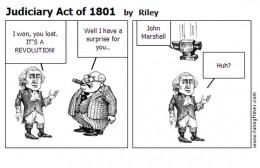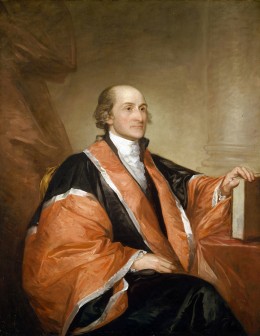What was the smallest USSC number in history?
What was the smallest USSC number in history?
Right now there are 8 instead of the full nine? Has there ever been 7, 6 or 5? What if a second judge leaves or dies and there are only 7 and Republicans still refuse to comment or confirm an Presidential appointment? What if there were 4, 3, 2, 1 and then finally ZERO. essentially removing the third branch of a balanced government?
In 1789 Congress set the number of Judges to 6. 1801 Congress reduced the number to five. 1807 changed it to 7. 1837 went up to 9 to reflect the number of regional circuits.
The SC decisions over the years have either been bad or just not useful. They have allowed the federal government to increase in size and scope by taking the 2 line Interstate Commerce Clause so liberal as to make anything a federal matter. They have struck down any arguments against the Federal Income Tax.
They have tried to solve social issues, and they failed as government cannot solve social issues. Making laws or decisions cannot change the minds of people.
The worst decisions made by the SC are the 5-4 simple majority ones. That leaves the wisdom and opinions of 4 equally qualified jurists shut down. When the SC makes a decision it should at least try to resolve the issues before the court. Take Roe v Wade, it was a bad decision because the part of the constitution the majority used didn't really apply. Additionally, the court didn't provide judicial notice as to when life begins. Because when life begins then we have the baby and its rights to deal with. Their decision on gay marriages doesn't do anything. It takes away the power of the states, and it doesn't help couples that don't want to get married, but want to have some control in the partners life. Obamacare was another bad decision as the reform didn't reform much. Yes, it got insurance companies to not reject people for prior conditions, but that could have been done with a single focused laws. It didn't negotiate the price for prescriptions, or better yet it didn't merge prescriptions into the medical It was also decided that it was a TAX. What other programs are taxes, Social Security and Medicare.
You can check it out yourself, but I submit that at best there were only a handful of even useful SC decisions.
As to the current 8 member SC, the problem is the simple majority to win a decision. The SC decisions become the law of the land. Shouldn't that require more than a simple one vote majority?? How about a 7-2 vote making it much more like passing an amendment?
Actually, it is good that we have a 4-4 split as the least number of SC decisions the better off is the country.
If you want to make better decisions than use the Amendment Process because it is based on the people and the Congress, President, or the SC.I think we refer to them as SCOTUS like POTUS
Eric
I meant to say and NOT Congress, the president or the SC.
During FDR he a 15 member SCOTUS. The problem was the founders left the details of the Judiciary Branch up to Congress. Not a wise choice in the long run!Call me infantile but I think of SCROTUS every time I see SCOTUS
Under the Judiciary act the court would not be able to hear any cases if they did not have a quorum of 6 justices, so once the Supreme Ct got down to 5 justices they would effectively be useless. As for the questions of having less justices, the answer is the number of justices has changes overtime as it is Congress who determines the number of Justices, and there was a time that the number of justices was pegged at 6 which you later mentioned. Even without the full panel of judges the Supreme Ct would most likely be able to here most cases. The issue comes into play if a justice needs to recuse them self from a case which happened just recently in the University of Texas case where Elena Kagan had to recuse herself thereby leaving 7 justices to here or one over the minimum of quorum.
The issue I have with the Senate over this issue is that is sets up a horrible precedent. The President is supposed to appoint a Supreme Ct Justice; then the Senate Judiciary Committee is supposed to interview the nominee and make a recommendation to the Senate; and then the Senate is supposed to vote up or down. The fact that Senate leaders have openly said they would languish the nominee in committee; or without knowing anything about any potential nominees state they would vote down the appointment; or if there was any hint of a few defections to the other side on a vote filibuster the nominee without even knowing who the nominee is makes a mockery of the Senate and the whole judicial appointment process. Whether one likes a President or not, the senate should not politicize this issue with mere nonsense or let's wait for the next president. What if the Senate doesn't like the next president, do we wait another four years before the Senate will even consider giving this process the respect it deserves? I know some people will "rationalize" this is ok and say well didn't this guy do this or ignore that? I am not here to debate other issues in this forum other than the question posed by the original poster. Additionally, rationalization that it is ok to not fulfill an obligation because one does not like the sitting president or is upset about the president on another issue is lazy thinking. Two wrongs don't make a right, and rationalizing that is is ok to shirk a duty because a perceived issue in another area is the type of thinking which is causing so much inefficiency in government and business everywhere.It really doesn't matter as long as the SCOTUS can make simple majority decisions. It is better that they don't hear cases, they do less damage.
Can you name more than a hand full of SCOTUS cases that were beneficial to the country and the people?Due to character limitations I will name a couple:. Loving vs Harding; Brown v bd of Ed; Miranda v Arizona. This case would have had a majority vote is the Senate did not outright tell the Pres they would refuse to do their job.
I don't understand your last sentence.
BTW Civil Rights weren't solved by Loving vs Virginia, or Brown.
Miranda was one of 4 cases, and the 5-4 dec was not clear and convincing. Over the years, the decision has been watered down on the streets.Cases address specific questions, as such, they may not solve all Civil Rights, but they solved the civil rights issue brought forth which is very important. Last sentence was in regard to recent Sup Ct case.
solve a problem or replace it with another problem.
Don't know what recent SC you are referring to here?BradOcal ignores any input that appears to contradict his inner model of reality. It's called willful ignorance. That's why some people perceive him as a troll or bot. I'm glad he has strong views, some are carved in granite.

I really didn't get a answer as to the smallest number of standing judges for SCOTUS. So I figured the very first one would be the smallest at the inception of the US.
From http://supreme-court-justices.insidegov … 1/John-Jay
There were 3 concurrently serving justices. So I am assuming that the smallest number of standing judges for SCOTUS = 3
John Jay, William Paterson and Thomas Johnson, (who served less than 5 months).
Related Discussions
- 19
Do you think that SCOTUS decisions should require more than a simple majority to
by Brad 9 years ago
Do you think that SCOTUS decisions should require more than a simple majority to decide a case.With a 5-4 decision, 4 SC justices are disregarded while a single vote decides the case. The decision becomes the law of the land, but does that even come close to resolving the issues underlying the...
- 47
Ted Cruz is Nuts: SC should be held accountable to voters?
by Credence2 20 months ago
Ted Cruz and much of the Conservative community have been sore losers, after 2 recent Supreme Court Decisions "threw them under the bus". See brief article below:http://www.huffingtonpost.com/2015/06/2 … lp00000592Accusing the court of judicial activism, he says that he believes...
- 20
Obama: No ‘radical’ budget fix needed
by bahersadek 14 years ago
Fighting back against Republican calls for greater spending cuts, President Obama said Friday that the government doesn’t need to make major changes to get its budget back on track and called for that solution to include some trims coupled with tax increases.“Here’s the good news: that it turns out...
- 24
The Robert's Court is about to become the most Activist Court Ever
by Scott Belford 4 months ago
The Conservative Robert's Supreme Court is about to assign another long-standing precedent, this one which protects the lives of all Americans, to the judicial graveyard along side the devastating Dobb's decision which took away women's federally protected right to privacy.In 1984, the Court ruled...
- 45
The number of Supreme Court justices
by Kathleen Cochran 15 months ago
The population of the US was a small fraction of what it has been since the number of Supreme Court justices was set. Many European countries have high courts with higher numbers than ours even though their populations are much smaller. Politics aside, Is it representative of our population to have...
- 54
Why Are Republicans So Out Of Touch?
by LucidDreams 12 years ago
I am not saying ALL Republicans are, I am just wondering why anyone would actually stay with a party that is clearly not on the same page as most of America? Most (not all) but most who are die hard right Republicans watch Fox news. Not sure if you have noticed, they can't even get along with each...









